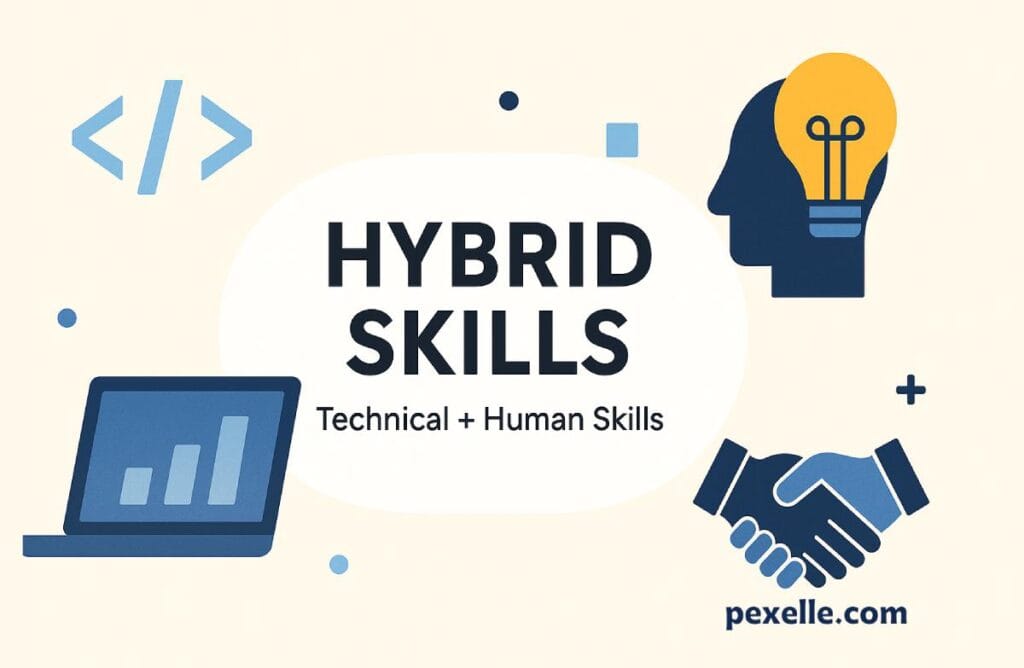Hybrid Skills: Who Owns the Future of Work?

In today’s rapidly evolving job market, the lines between hard and soft skills are blurring. Employers are no longer just looking for specialists in narrow domains—they’re seeking professionals who bring a hybrid skillset to the table. These individuals, equipped with both technical expertise and interpersonal abilities, are becoming the driving force behind innovation, adaptability, and long-term business success.
1. What Are Hybrid Skills?
Hybrid skills refer to a combination of technical (hard) skills and interpersonal (soft) skills that together enhance a person’s ability to function effectively in dynamic work environments. For example, a data analyst who can present complex findings clearly to non-technical stakeholders, or a software developer who can collaborate smoothly within a cross-functional team, possesses valuable hybrid skills.
Common examples include:
- Data analysis + storytelling
- Coding + project management
- UX design + behavioral psychology
- Marketing + analytics
- AI/ML + ethics or policy understanding
2. Why Hybrid Skills Matter More Than Ever
The shift toward automation and artificial intelligence is changing the job landscape. While machines may handle repetitive and highly technical tasks, uniquely human skills—such as creativity, emotional intelligence, and ethical reasoning—remain irreplaceable. Professionals who blend both sides of the skill spectrum are more resilient and adaptable in times of change.
According to a recent World Economic Forum report, “the most in-demand roles require both analytical thinking and active learning combined with leadership and social influence.” This hybrid model is also highly relevant for jobs of the future like:
- AI policy advisors
- Digital health strategists
- Cybersecurity communicators
- Sustainability tech consultants
| Industry | Hybrid Role Example | Key Hybrid Skills |
| Healthcare | Digital Health Specialist | Health knowledge + tech systems + empathy |
| Finance | Fintech Product Manager | Financial literacy + coding + UX collaboration |
| Education | EdTech Curriculum Designer | Instructional design + AI tools + storytelling |
| Marketing | Growth Hacker | SEO/SEM + data analytics + creativity |
| Tech | Human-Centered AI Developer | ML/AI + ethics + UX/UI |
4. How to Develop Hybrid Skills
Developing hybrid skills requires intentional upskilling across disciplines. Here’s how to get started:
- Online learning platforms (e.g., Coursera, edX, LinkedIn Learning) for cross-functional skills
- Side projects that involve interdisciplinary collaboration
- Soft skill workshops in communication, leadership, and design thinking
- Reading outside your field to build a more integrated mindset
- Mentorship or reverse mentoring with someone from a different background
🎯 Tip: Pair every technical skill you gain with a human skill—this balanced growth can make you irreplaceable in your team.
5. The Future Belongs to the Hybrid Professional
As work continues to evolve, those who can bridge the gap between machines and people, data and insight, code and context—will not just survive but thrive. Whether you’re entering the job market or seeking to future-proof your career, investing in hybrid skills is one of the smartest moves you can make.
Because the future of work doesn’t belong to the most technical or the most charismatic—it belongs to those who can be both.
Source : Medium.com




